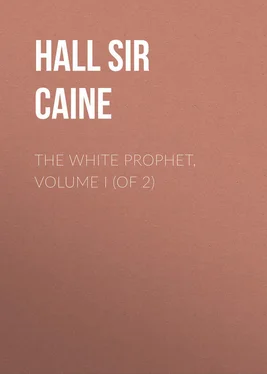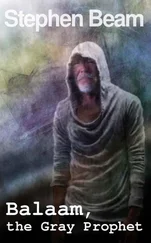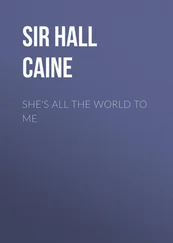Hall Caine - The White Prophet, Volume I (of 2)
Здесь есть возможность читать онлайн «Hall Caine - The White Prophet, Volume I (of 2)» — ознакомительный отрывок электронной книги совершенно бесплатно, а после прочтения отрывка купить полную версию. В некоторых случаях можно слушать аудио, скачать через торрент в формате fb2 и присутствует краткое содержание. Жанр: foreign_antique, foreign_prose, на английском языке. Описание произведения, (предисловие) а так же отзывы посетителей доступны на портале библиотеки ЛибКат.
- Название:The White Prophet, Volume I (of 2)
- Автор:
- Жанр:
- Год:неизвестен
- ISBN:нет данных
- Рейтинг книги:5 / 5. Голосов: 1
-
Избранное:Добавить в избранное
- Отзывы:
-
Ваша оценка:
- 100
- 1
- 2
- 3
- 4
- 5
The White Prophet, Volume I (of 2): краткое содержание, описание и аннотация
Предлагаем к чтению аннотацию, описание, краткое содержание или предисловие (зависит от того, что написал сам автор книги «The White Prophet, Volume I (of 2)»). Если вы не нашли необходимую информацию о книге — напишите в комментариях, мы постараемся отыскать её.
The White Prophet, Volume I (of 2) — читать онлайн ознакомительный отрывок
Ниже представлен текст книги, разбитый по страницам. Система сохранения места последней прочитанной страницы, позволяет с удобством читать онлайн бесплатно книгу «The White Prophet, Volume I (of 2)», без необходимости каждый раз заново искать на чём Вы остановились. Поставьте закладку, и сможете в любой момент перейти на страницу, на которой закончили чтение.
Интервал:
Закладка:
He lingered as long as he dared, and when he took up his cap and riding-whip she threw the same chiffon veil over her head and walked with him through the garden to the gate. There they parted, and when, a little ashamed of himself, he held her soft white hand somewhat too long and pressed it slightly, he thought an answering pressure came back from her.
In three weeks they were engaged.
The General trembled when he heard what had happened, protested he was losing the only one he had in the world, asked what was to become of him when Helena had to go away with her husband, as a soldier's wife should, but finally concluded to go on half-pay and follow her, and then said to Gordon, "Speak to your father. If he is satisfied, so am I."
The Consul-General listened passively, standing with his back to the fireplace, and after a moment of silence he said —
"I've never believed in a man marrying for rank or wealth. If he has any real stuff in him he can do better than that. I didn't do it myself and I don't expect my son to do it. As for the girl, if she can do as well for her husband as she has done for her father, she'll be worth more to you than any title or any fortune. But see what your mother says. I'm busy. Good-day!"
His mother said very little; she cried all the time he was telling her, but at last she told him there was not anybody else in the world she would give him up to except Helena, because Helena was gold – pure, pure gold.
Gordon was writing to Helena now: —
"DEAREST HELENA, – Dreadfully disappointed I cannot dine with you to-night, having to go to Alexandria to-morrow, and finding it necessary to begin preparations immediately.
"You must really be a witch – your prediction proved to be exactly right – it was about the new Mahdi, the new prophet, my father wished to speak to me.
"The Governor thinks the man is making mischief, inciting the people to rebellion by preaching sedition, so with the General's consent I am to smash him without delay.
"Hafiz is to go with me to Alexandria, and strangely enough, he tells me over the telephone that the new prophet, as far as he can learn, is not a firebrand at all; but I am just off to see his uncle, the Chancellor of the University, and he is to tell me everything about him.
"Therefore think of me to-night as penned up in the thick atmosphere of El Azhar, tête-à-tête , with some sallow-faced fossil with pock-marked cheeks perhaps, when I hoped to be in the fragrant freshness of the Citadel, looking into somebody's big black eyes, you know.
"But really, my dear Nell, the way you know things without learning them is wonderful, and seems to indicate an error of nature in not making you a diplomatist, which would have given you plenty of scope for your uncanny gift of second sight.
"On second thoughts, though, I prefer you as you are and am not exactly dying to see you turned into a man.
"Maa-es-salamah! I kiss your hand!
"GORDON.
" P.S. – Your father would get a letter from the Consul-General suggesting my task, but of course I must go up for his formal order, and you might tell him I expect to be at the Citadel about tea-time to-morrow, which will enable me to kill two birds with one stone, you know, and catch the evening train as well.
"Strange if it should turn out that this new Mahdi is a wholesome influence after all, and not a person one can conscientiously put down! I have always suspected that the old Mahdi was a good man at the beginning, an enemy created by our own errors and excesses. Is history repeating itself? I wonder! And if so, what will the Consul-General say? I wonder! I wonder!"
Gordon was sealing and addressing his letter when his soldier servant brought in Hafiz, a bright young Egyptian officer, whose plump face seemed to be all smiles.
"Helloa! Here you are!" cried Gordon, and then giving his letter to his servant, he said, "Citadel – General's house, you know… And now, Hafiz, my boy, let's be off."
CHAPTER VII
El Azhar is a vast edifice that stands in the midst of the Arab quarter of Cairo like a fortress on an island rock, being surrounded by a tangled maze of narrow, dirty, unpaved streets, with a swarming population of Mohammedans of every race; and the Christian who crosses its rather forbidding portals feels that he has passed in an instant out of the twentieth century and a city of civilisation into scenes of Bible lands and the earliest years of recorded time.
It is a thousand years old, and the central seat of Moslem learning, not for Egypt only but for the whole of the kingdoms and principalities of the Mohammedan world, sending out from there the water of spiritual life that has kept the Moslem soul alive through centuries of persecution and pain.
As you approach its threshold a monotonous cadence comes out to you, the murmur of the mass of humanity within, and you feel like one who stands at the mouth of some great subterranean river whose waters have flowed with just that sound on just that spot since the old world itself was young.
It was not yet full sunset when the two young soldiers reached El Azhar, and after yellow slippers had been tied over their boots at the outer gate they entered the dim, bewildering place of vast courts and long corridors, with low roofs supported by a forest of columns, and floors covered by a vast multitude of men and boys, who were squatting on the ground in knots and circles, all talking together, teachers and pupils, and many of them swaying rhythmically to and fro to a monotonous chanting of the Koran whose verses they were learning by heart.
Picking their way through the classes on the floor, the young soldiers crossed an open quadrangle and ascended many flights of stairs until they reached the Chancellor's room in the highest roof, where the droning murmur in the courts below could be only faintly heard and the clear voice of the muezzin struck level with their faces when he came out of a minaret near by and sent into the upper air, north, south, east, and west, his call to evening prayers.
They had hardly entered this silent room, with its thick carpets on which their slippered feet made no noise, when the Chancellor came to welcome them. He was a striking figure, with his venerable face, long white beard, high forehead, refined features, graceful robes, and very soft voice, a type of the grave and dignified Oriental, such as might have walked out of the days of the prophet Samuel.
"Peace be on you!" they said.
"And on you too! Welcome!" he said, and motioned them to sit on the divans that ran round the walls.
Then Hafiz explained the object of their visit – how Gordon was ordered to Alexandria to suppress the riots there, and, if need be, to arrest the preacher who was supposed to have provoked them.
"I have already told him," said Hafiz, "that so far as I know Ishmael Ameer is no firebrand; but, hearing through the mouth of one of our own people that he is another Mahdi, threatening the rule of England in Egypt – "
"Oh, peace, my son," said the Chancellor. "Ishmael Ameer is no Mahdi. He claims no divinity."
"Then tell me, O Sheikh," said Gordon, "tell me what Ishmael Ameer is, that I may know what to do when it becomes my duty to deal with him."
Leisurely the Chancellor took snuff, leisurely he opened a folded handkerchief, dusted his nostrils, and then, in his soft voice, said —
"Ishmael Ameer is a Koranist – that is to say, one who takes the Koran as the basis of belief and keeps an open mind about tradition."
"I know," said Gordon. "We have people like that among Christians – people who take the Bible as the basis of faith and turn their backs on dogma."
"Ishmael Ameer reads the Koran by the spirit, not the letter."
"We have people like that too – the letter killeth, you know, the spirit maketh alive."
Читать дальшеИнтервал:
Закладка:
Похожие книги на «The White Prophet, Volume I (of 2)»
Представляем Вашему вниманию похожие книги на «The White Prophet, Volume I (of 2)» списком для выбора. Мы отобрали схожую по названию и смыслу литературу в надежде предоставить читателям больше вариантов отыскать новые, интересные, ещё непрочитанные произведения.
Обсуждение, отзывы о книге «The White Prophet, Volume I (of 2)» и просто собственные мнения читателей. Оставьте ваши комментарии, напишите, что Вы думаете о произведении, его смысле или главных героях. Укажите что конкретно понравилось, а что нет, и почему Вы так считаете.












